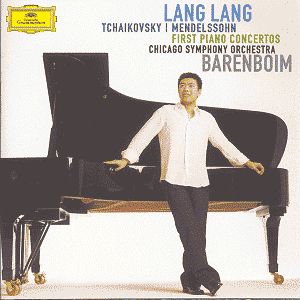The
general reception to Lang Lang’s recorded output thus far appears
to suggest that microphones held up to his Steinway fail to accommodate
his halo. Yet his astonishing rendition (‘like a possessed devil’
wrote Marc Bridle) of Tchaikovsky’s first piano concerto earlier
this year at the Royal Festival Hall, and a similarly accomplished
performance at the BBC Proms this year augured well for this release.
So it was into this unpredictable climate of mixed expectations
that the Chicago Symphony Orchestra under Daniel Barenboim launched
into those immortal chords, heralding the debut recording of the
20-year old pianist for Deutsche Grammophon.
Those
who have heard Lang Lang perform this piece in concert will recall
the improvisatory quality to his playing, outlandish gestures
and total pianistic command allied to a sensitive ear for ensemble.
By comparison this studio recording is considerably restrained
and lacks the dramatic impetus he has demonstrated elsewhere.
Perhaps this is an inevitable consequence of recording the concerto
in an environment where adrenaline doesn’t quite reach down to
the fingertips. Or perhaps the conductor insisted on emphasising
the nobility and grandeur of the piece at the expense of generating
excitement and fist-shaking virtuosity. Whatever the reason, the
first movement feels disappointingly uncommunicative; and although
things get better in the second and third movements - in particular,
the impressive whirlwind prestissimo section of the second
movement - the overall impression is that it has simply served
to provide a solid template for Lang Lang to set alight in future
performances.
In
their seminal volume, Music for the Piano, Friskin and
Freundlich describe Mendelssohn’s G minor piano concerto as possessing
all the composer’s virtues, containing, ‘idiomatic piano writing
with a great deal of technical variety, mastery of design, and
expert scoring for the combination of solo instrument and orchestra.’
Lang
Lang was just 7 years old when he first performed this concerto
and his decision to pair it with the Tchaikovsky was in order
to ‘show(s) another side of what an artist can do’. The Mendelsssohn
arguably does not require the soloist to harness the latent energy
of an audience to the same extent as the Tchaikovsky and, as a
consequence, the overall performance is more successful. The first
movement receives an authoritative, if not totally authentic workout,
full of snapping octaves and piston-like fingerwork, but I would
have liked to hear more Chopin and less Czerny, especially in
the flowery semi-quaver passages which decorate the score. Once
again, the later movements receive more involvement and, in the
playful third movement, Lang shows us some of that infectious
music-making that characterise his concerts. Barenboim and the
CSO provide stoic support throughout.
Lang
Lang is undoubtedly an extra-ordinarily gifted pianist but to
describe him as such on the basis of this or any other of his
recordings surely cannot be justified. For the Tchaikovsky, there
are a number of more rewarding alternatives; sample, for example,
Argerich’s recordings on DG with Dutoit (1970, studio) or with
Abbado (1994, live). Stephen Hough has recorded a delightful disc
of Mendelssohn’s works for piano and orchestra with his accustomary
suavity on Hyperion, while Jean-Yves Thibaudet has put down on
disc a contrasting, feverish performance on Decca. If you want
to find out what all the fuss is about Lang Lang try to catch
him at his next concerto performance in London, which will be
in June 2004 at the Royal Festival Hall. He is due to play the
first of Beethoven’s piano concertos with the LPO under Vladimir
Jurowski.
Michael
McMillan
